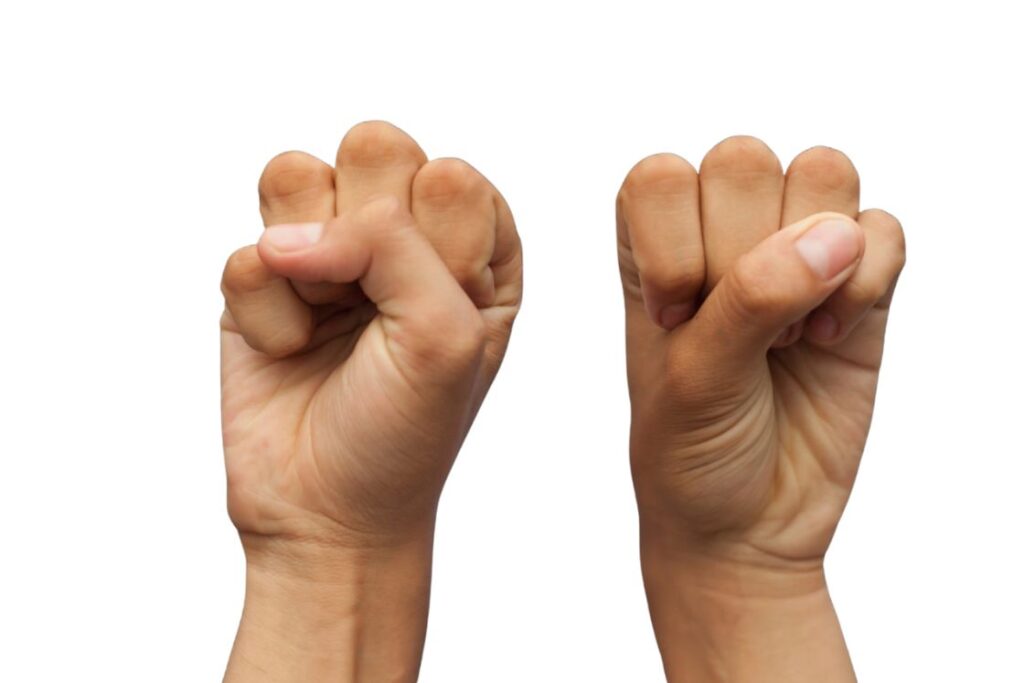
Mushti Mudra, or the “fist gesture,” is a simple yet powerful hand gesture used in yoga and meditation. The term comes from the Sanskrit words “Mushti,” meaning “fist,” and “Mudra,” meaning “gesture” or “seal.” Much like how a newborn’s hands naturally form a fist, this gesture is often a subconscious response to negative emotions such as anger and frustration.
By practicing Mushti Mudra, even for just five minutes, you can effectively release concealed anger and irritation, bringing balance to your mind and body. Let’s explore how this simple gesture can offer a range of benefits and enhance your well-being.
What does Mushti mean in Sanskrit?
Mushti is a Sanskrit term that refers to “fist” or “closed hands”. Mushti Mudra involves forming a fist by clenching the fingers and wrapping the thumb around them.
This simple yet effective gesture helps manage anger and negative emotions by mirroring the body’s natural reaction to such feelings.
In addition to being a yogic hasta mudra, Mushti Mudra is also an asamyukta hand gesture used in Bharatanatyam, a traditional Indian dance form.
Symbolic representation
Mushti Mudra symbolizes strength, force, and determination. It signifies:
- Grasping Objects: Control and command.
- Combative Position: Readiness to confront challenges.
- Steadfastness: Inner resolve and stability.
In Hindu texts like the Vishnu Purana, Lord Vishnu uses Mushti Mudra to combat demons, illustrating its role in harnessing force and releasing pent-up emotions.
Mushti Mudra also engages the five basic elements (panchatattva) – Agni (fire), Vayu (air), Akasha (ether), Prithvi (earth), and Jala (water). By incorporating elements from Vayu Mudra, Shunya Mudra, Surya Mudra, and Jalodara Nashaka Mudra, it emphasizes fire (Agni), generating heat and energy in the body.
How to do Mushti Mudra?

Follow these steps to make Mushti Mudra:
- Sit in a relaxed pose with the back of your hands on your thighs.
- Take a few long deep breaths, feeling a sense of letting go and saying “no” to distractions.
- To make Mushti mudra, clench the fingers of both hands towards the palm and place your thumb over the first three fingers.
- Apply mild pressure to the fingers.
- Observe the physical sensations in your hands and emotional changes while inhaling and directing prana towards the Manipura Chakra.
- Hold Mushti Mudra with deep breathing for 5 to 15 minutes.
Before practicing Mushti Mudra, it’s helpful to perform the following preparatory mudras. These will prepare your hands and fingers for the mudra:
After holding mushti mudra for the recommended time, practice following mudras to get enhanced effects:
Best time and duration for Mushti Mudra
- When to Practice: You can practice Mushti mudra whenever you feel overwhelmed by negative emotions, or to aid digestion, meditation, and anger management.
- Ideal Time: Morning, between 4 am and 6 am, for optimal concentration and effectiveness.
- Duration: Practice for 30-40 minutes daily. You can split this into 10-15 minute sessions, aiming for at least 20 minutes per session.
Note: Practicing Mushti Mudra for 10 minutes after meals is also beneficial for improving digestive health.
Precautions
- Avoid clenching your fists too tightly; fingers should be comfortably curled.
- Maintain a straight spine and relaxed shoulders to ensure smooth breathing.
- Practice regularly with patience, as benefits take time to appear.
- Listen to your body and adjust if you experience any discomfort or pain.
There are no known side effects of Mushti Mudra.
Mushti Mudra Benefits
Holding your hands in mushti mudra can benefit various health conditions:
- Relieves negative emotions such as anger, fear, and frustration.
- Stimulates the liver and boosts stomach energy, aiding digestion.
- Helps cure constipation and lack of appetite.
- Releases trapped tensions in the body.
- Lowers blood pressure.
- Balances the body’s elements (Vayu, Akash, Prithvi, and Jala) to prevent health issues.
- Soothes the mind, clearing worries and unwanted thoughts.
- Helps with mental health issues like depression and frustration.
- Generates body heat, alleviating shivering from cold or cough.
- Increases enthusiasm, eliminating laziness and lethargy.
Conclusion
Mushti Mudra is a powerful tool for managing negative emotions and cultivating inner peace. By integrating this simple yet effective practice into your daily routine, you can harness its benefits to improve your mental and physical well-being. Whether you’re dealing with stress, anger, or frustration, Mushti Mudra offers a path to greater emotional balance and a more peaceful state of mind.
Next time you feel overwhelmed by negative emotions, remember to form a fist, breathe deeply, and let go of what no longer serves you.

